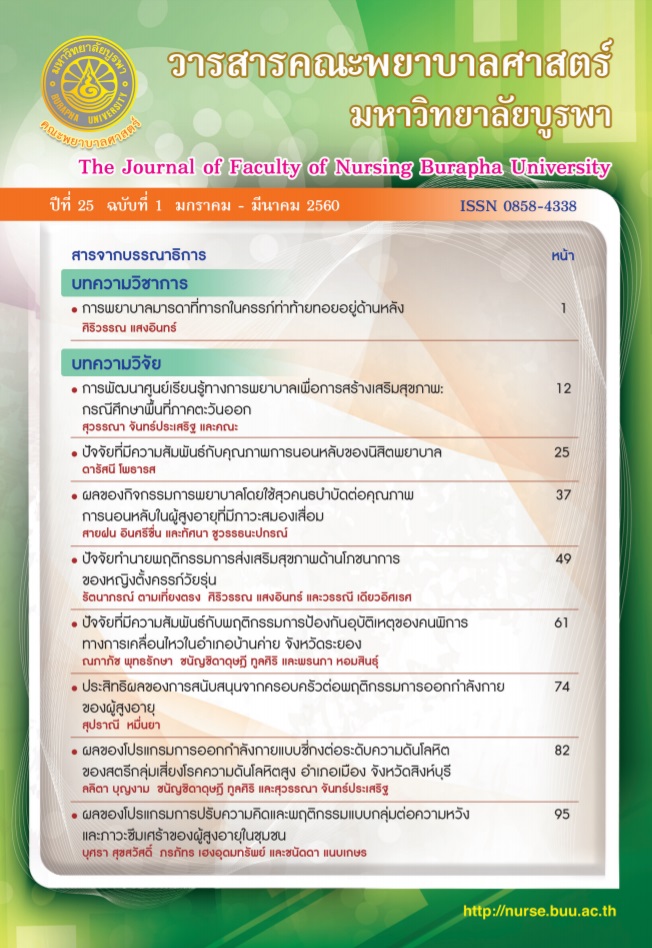ปัจจัยที่มีความสัมพันธ์กับคุณภาพการนอนหลับของนิสิตพยาบาล
คำสำคัญ:
คุณภาพการนอนหลับ, ปัจจัยที่มีความสัมพันธ์กับคุณภาพการนอนหลับ, นิสิตพยาบาล, Quality of sleep, factors related to quality of sleep, nursing studentบทคัดย่อ
การวิจัยครั้งนี้เป็นการวิจัยเชิงพรรณนาเพื่อศึกษาถึงปัจจัยที่มีความสัมพันธ์กับคุณภาพการนอนหลับของนิสิตคณะพยาบาลศาสตร์ มหาวิทยาลัยบูรพา กลุ่มตัวอย่างเป็นนิสิตคณะพยาบาลศาสตร์ มหาวิทยาลัยบูรพา ที่กำลังศึกษาในปีการศึกษา 2554 โดยการสุ่มตัวอย่างแบบชั้นภูมิ ตามสัดส่วนนิสิตในแต่ละชั้นปี จำนวน 255 คน เครื่องมือเก็บข้อมูลเป็นแบบสอบถาม ประกอบด้วย ข้อมูลส่วนบุคคล ปัจจัยด้านเศรษฐกิจและสังคม คุณภาพการนอนหลับที่ดัดแปลงมาจากแบบวัดดัชนีคุณภาพการนอนหลับของมหาวิทยาลัยพิตส์เบิร์ก (Pittsburgh Sleep Quality Index (PSQI), 2013) ระดับความเครียดและระดับความวิตกกังวล และแบบแผนการดำเนินชีวิต สถิติที่ใช้ในการวิเคราะห์ข้อมูล ได้แก่ การแจกแจงความถี่ ค่าร้อยละ ค่าเฉลี่ย และส่วนเบี่ยงเบนมาตรฐาน ค่าสัมประสิทธิ์สหสัมพันธ์แบบเพียร์สัน (Pearson Product Moment Correlation Coefficient)
ผลการศึกษาพบว่า กลุ่มตัวอย่างส่วนใหญ่มีคุณภาพการนอนหลับดี (≤ 5 คะแนน) คิดเป็นร้อยละ 57.53 ค่าเฉลี่ยคะแนนคุณภาพการนอนหลับเท่ากับ 5.29 ± 1.80 คะแนน ปัจจัยที่มีความสัมพันธ์กับคุณภาพการนอนหลับของนิสิตพยาบาลมากที่สุด คือ ระดับความเครียด รองลงมา คือ ระดับความวิตกกังวล แบบแผนการดำเนินชีวิตโดยรวม โดยปัจจัยที่มีความสัมพันธ์กับคุณภาพการนอนหลับที่ไม่ดี ได้แก่ ระดับความเครียด (r =.28, p .00) ระดับความวิตกกังวล (r = .27, p .00) แบบแผนการดำเนินชีวิตโดยรวม (r = .12, p .01) ส่วนปัจจัยที่มีความสัมพันธ์กับคุณภาพการนอนหลับที่ดี ได้แก่ การนอนหลับในห้องที่มีอากาศถ่ายเทสะดวกหรือห้องที่มีอากาศเย็นสบาย (r = -.11, p .02) และการนอนหลับในห้องที่เงียบสงบ ปราศจากเสียงรบกวน (r = -.09, p .05)
จากผลการศึกษามีข้อเสนอแนะให้อาจารย์พยาบาลตระหนักถึงความสำคัญของความเครียดและความวิตกกังวลของนิสิตพยาบาล โดยทำการประเมินระดับความเครียดและระดับความวิตกกังวลของนิสิตพยาบาลอย่างต่อเนื่อง และให้ความช่วยเหลือแก่นิสิตพยาบาลเพื่อบรรเทาความเครียดและความวิตกกังวล หรือสนับสนุนให้นิสิตพยาบาลสามารถปรับตัวได้อย่างมีประสิทธิภาพ เพื่อคุณภาพการนอนหลับที่ดี
This descriptive research aimed to study factors related to nursing students’
quality of sleep, Faculty of Nursing, Burapha University. The samples were 255 nursing students who were studying in 2011 and were recruited by simple random sampling. They evaluated the demographic questionnaire and an economic and social factor, the quality of sleep assessment tool that adjusted from the Pittsburgh Sleep Quality Index, stress and anxiety assessment tool and the lifestyle questionnaire. The statistics used for data analysis were frequency, percentage, average, standard deviation and Pearson Product Moment Correlation Coefficient.
The study indicated that 57.53 percent of samples had the good quality of sleep (PSQI ≤ 5 points). The mean of quality of sleep score was 5.29 ± 1.80 points. The most factors associated with sleep quality of nursing students was stress and anxiety score, followed by the lifestyle. Factors associated with poor quality of sleep were stress score (r = .28, p .00), anxiety score (r = .27, p .00), lifestyle (r = .12, p .01). Factors associated with good quality of sleep were sleeping in a well-ventilated room or a cool room (r = -.11, p .02) and sleeping in a quiet room (r = -.09, p .05).
This study has suggested that instructors realize the importance of the stress and anxiety of nursing students by continuously evaluating stress and anxiety score of nursing students, helping to relieve stress and anxiety, and encouraging to effectively adaptation for good quality of sleep.





